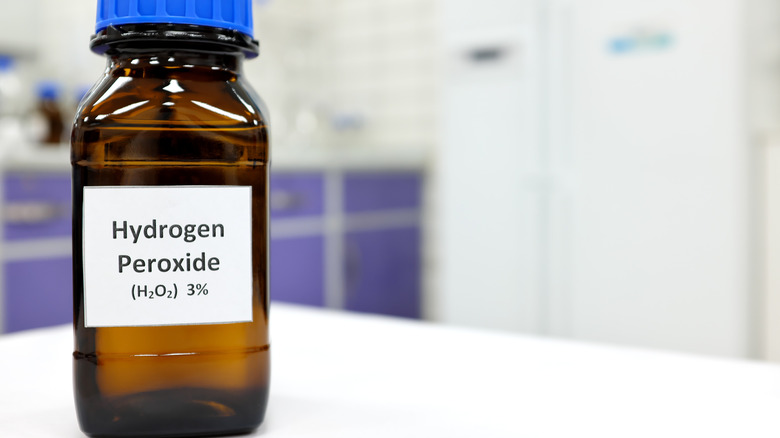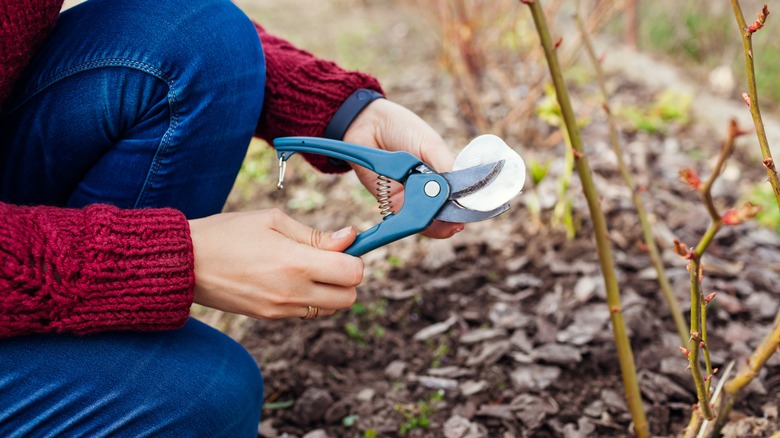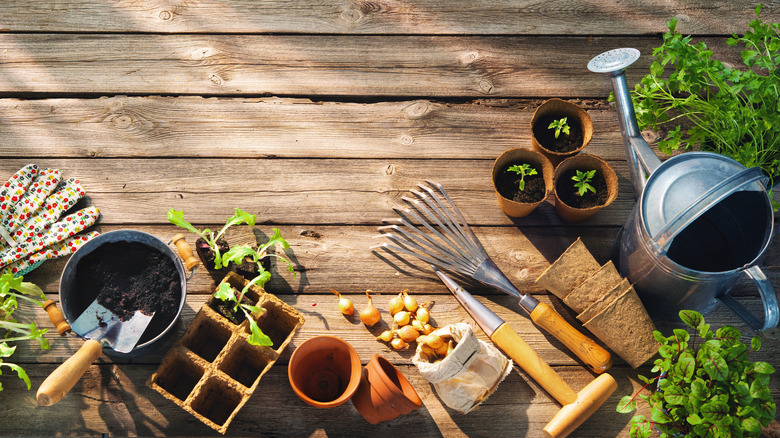We may receive a commission on purchases made from links.
By the end of a vigorous gardening season, a set of garden tools can become quite filthy, especially if they’ve been left outside to fend for themselves in the elements, rather than being stored properly. Frequent use and contact with dirt, sand, rocks, water, and other abrasive materials can cause grime or rust to build up on the surface of your tools. While this is normal and expected for tools used in the garden, it’s important to clean them regularly in order to maintain their proper function and extend their lifespan. Moreover, clean tools mean a healthy garden. Dirty tools can transmit diseases between plants in the garden, ultimately impacting your plants’ yield or productivity. Fortunately, you likely have an inexpensive solution waiting in your medicine cabinet. Hydrogen peroxide is the secret ingredient you need to restore your tools to a clean and sanitary condition.
Hydrogen peroxide, commonly used as an antiseptic or bleaching agent, is a great choice to clean your garden tools. It’s quick, easy, and extremely inexpensive: Hydrogen Peroxide is widely available at grocery stores, drug stores, and even Amazon, with the latter’s recommended brand ringing in at $5.60 for 16 fluid ounces. Even beyond the garden, it’s great to have on hand for small cuts, scrapes, and burns as a first aid treatment. Nevertheless, what works to keep your skin healthy, will also benefit your plants and your garden, too. So grab a bottle and head to the shed to clean up those tools.
How to clean tools with hydrogen peroxide

While it’s ideal to clean and disinfect your tools each time you use them to prevent spreading of plant diseases, at least twice a season—at the beginning and end—is recommended. For larger garden tools, begin by mixing two cups of hydrogen peroxide and one gallon of water in a bucket. Submerge the metal parts of the tools in the solution and allow them to soak for about 20-30 minutes. This waiting period allows the solution to penetrate and loosen up the stubborn dirt and grime, making the cleanup process a breeze. At the same time, it will also kill any bacteria or fungi living on the tools. For smaller tools, simply dampen a clean rag or hand towel with hydrogen peroxide and use it to wipe down the metal parts of the tools.
While a hydrogen peroxide soak works wonders for cleaning and disinfecting, heavy rust requires some more elbow grease. You’ll need to pair the hydrogen peroxide with some baking soda to tackle these difficult stains. To begin, make a paste from equal parts of baking soda and hydrogen peroxide, though you may need more liquid if it is too dry. Spread the paste on the rusty parts of the tools and allow it to sit for at least 15 minutes. Scrub the rust off with an abrasive pad and then rinse with water and dry before storing.
Why hydrogen peroxide works

Hydrogen peroxide is an excellent agent to clean and disinfect your garden tools for a few key reasons. When it comes to rust removal, hydrogen peroxide’s efficacy lies in its reactive nature. Hydrogen peroxide, commonly found in brown bottles at your local pharmacy, is a powerful oxidizing agent. When applied to rusty surfaces, it reacts with the rust and breaks it down, making it easier to scrub away. When paired with baking soda, a mild abrasive, a collaborative effect occurs. Baking soda scours the rust mechanically, creating an environment for hydrogen peroxide to react with the iron oxide, breaking it down into more easily cleanable compounds. This dynamic duo not only eliminates rust, but also leaves the metal surfaces clean and revitalized.
Furthermore, hydrogen peroxide sanitizes by killing harmful bacteria and fungi that may be lurking on your tools. Its cleaning power comes from its ability to break down into water and oxygen, producing substances that are deadly to microorganisms. This process disrupts the cells of bacteria and fungi (per Healthline), making them inactive and promoting a healthier gardening environment. In short, hydrogen peroxide ensures your tools are not only rust-free but also free from harmful germs, contributing to the overall well-being of the plants in your garden.




